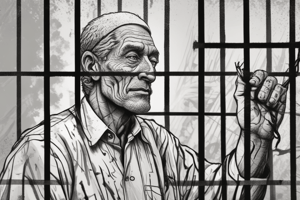Podcast
Questions and Answers
What is a key characteristic of a hate crime?
What is a key characteristic of a hate crime?
- Random targeting of individuals
- Unintentional harm to a particular group
- Crimes committed by individuals with a mental illness
- Intentional selection of a victim based on perceived group membership (correct)
What type of hate crime is motivated by bias against a person's religion or religious beliefs?
What type of hate crime is motivated by bias against a person's religion or religious beliefs?
- Religious hate cri (correct)
- Racial hate crime
- Gender-based hate crime
- Disability-based hate crime
What is a common effect of hate crimes on victims and communities?
What is a common effect of hate crimes on victims and communities?
- Emotional trauma and psychological distress (correct)
- Improved social relationships
- Increased trust in authorities
- Increased economic opportunities
Why is accurate data collection important for responding to hate crimes?
Why is accurate data collection important for responding to hate crimes?
What is a strategy for preventing hate crimes?
What is a strategy for preventing hate crimes?
What is a common challenge in reporting hate crimes?
What is a common challenge in reporting hate crimes?
What type of hate crime is motivated by bias against a person's gender or gender identity?
What type of hate crime is motivated by bias against a person's gender or gender identity?
What is a consequence of hate crimes on communities?
What is a consequence of hate crimes on communities?
Flashcards are hidden until you start studying
Study Notes
Definition
- A hate crime is a criminal offense committed with bias or prejudice based on race, religion, ethnicity, national origin, gender, sexual orientation, or disability.
Key Characteristics
- Intentional selection of a victim due to their perceived membership in a particular group
- Bias motivation plays a substantial part in the commission of the offense
- Physical harm, property damage, or intimidation can occur
Types of Hate Crimes
- Racial hate crimes: motivated by bias against a person's race, ethnicity, or national origin
- Religious hate crimes: motivated by bias against a person's religion or religious beliefs
- Gender-based hate crimes: motivated by bias against a person's gender or gender identity
- Sexual orientation-based hate crimes: motivated by bias against a person's sexual orientation
- Disability-based hate crimes: motivated by bias against a person with a disability
Effects of Hate Crimes
- Emotional trauma and psychological distress for victims and communities
- Fear and anxiety can lead to social isolation and reduced quality of life
- Undermines trust in authorities and institutions
- Can lead to further violence and retaliatory attacks
Reporting and Data Collection
- Many countries have laws requiring the collection of hate crime data
- Underreporting is a significant issue, often due to fear of retaliation or mistrust of authorities
- Accurate data collection is essential for understanding the scope of the problem and developing effective responses
Prevention and Response Strategies
- Education and awareness campaigns to promote tolerance and understanding
- Community-based initiatives to reduce prejudice and discrimination
- Law enforcement training to improve response to hate crimes
- Support services for victims, including counseling and advocacy
Hate Crimes
- Hate crimes are criminal offenses committed with bias or prejudice based on race, religion, ethnicity, national origin, gender, sexual orientation, or disability.
Key Characteristics
- Intentional selection of a victim due to perceived membership in a particular group
- Bias motivation plays a substantial part in the commission of the offense
- Can result in physical harm, property damage, or intimidation
Types of Hate Crimes
- Racial hate crimes: bias against race, ethnicity, or national origin
- Religious hate crimes: bias against religion or religious beliefs
- Gender-based hate crimes: bias against gender or gender identity
- Sexual orientation-based hate crimes: bias against sexual orientation
- Disability-based hate crimes: bias against individuals with a disability
Effects of Hate Crimes
- Emotional trauma and psychological distress for victims and communities
- Fear and anxiety can lead to social isolation and reduced quality of life
- Undermines trust in authorities and institutions
- Can lead to further violence and retaliatory attacks
Reporting and Data Collection
- Many countries have laws requiring hate crime data collection
- Underreporting is a significant issue, often due to fear of retaliation or mistrust of authorities
- Accurate data collection is essential for understanding the scope of the problem and developing effective responses
Prevention and Response Strategies
- Education and awareness campaigns to promote tolerance and understanding
- Community-based initiatives to reduce prejudice and discrimination
- Law enforcement training to improve response to hate crimes
- Support services for victims, including counseling and advocacy
Studying That Suits You
Use AI to generate personalized quizzes and flashcards to suit your learning preferences.




